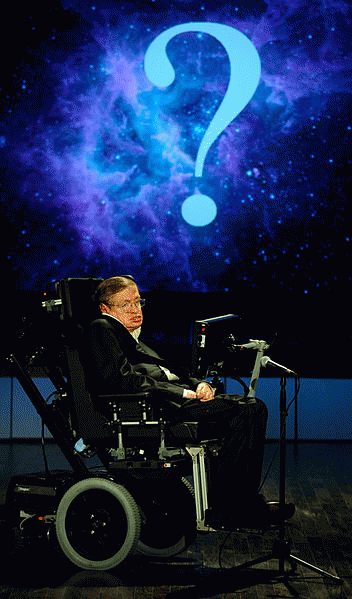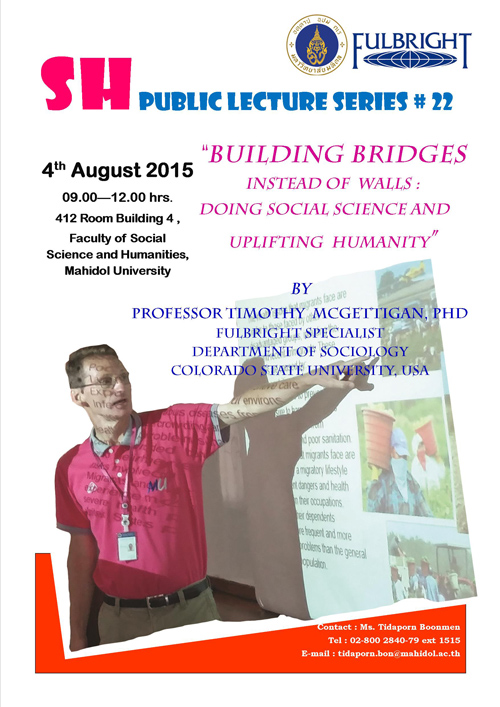Stephen Hawking is famous for asking deep, fascinating, enigmatic questions. by Wikimedia Commons One can hardly broach the subject of agency without acknowledging the long-standing and unresolved philosophical debate regarding the agency vs. determination dichotomy. To provide an illustration of the extent of disagreement over this dualism, determinists, such as Stephen Hawking have argued that agency and free will are nothing but an illusion:
...the molecular basis of biology shows that biological processes are governed by the laws of physics and chemistry and therefore are as determined as the orbits of the planets. Recent experiments in neuroscience support the view that it is our physical brain, following the known laws of science, that determines our actions and not some agency that exists outside those laws ...so it seems that we are no more than biological machines and that free will is just an illusion (Hawking and Mlodinow, 2010). Emphasis added.
Indeed, Hawking's deterministic perspective is so comprehensive that he believes if it were possible to build a computer that was sufficiently powerful to calculate each and every variable in the cosmos, then such a machine would be able to determine with absolute precision every aspect of every event that transpires in the universe from the big bang until the infinitely remote end of time. From Hawking's perspective, nothing moves, interacts, appears or disappears in the universe without having been minutely pre-determined by a chain of causality that was set in motion at the origin of the universe. Now that is a hard core determinist.
At the other end of the spectrum are those who believe in an indeterminate universe (Popper, 1988). Philosophies of indeterminacy take many forms, however, such perspectives tend to emphasize that endless varieties of random, inscrutable and uncertain phenomena render the universe ineluctably unpredictable. For example, Heisenberg's uncertainty principle asserts that it is impossible to determine both the velocity and position of any discrete particle: the process of determining one property has the effect of modifying the other property. Much to Einstein's displeasure, Niels Bohr elaborated upon Heisenberg's uncertainty principle by developing the theory of quantum mechanics. Bohr's "Copenhagen interpretation" is predicated on the realization that, at the quantum level, classical expectations about the normal, predictable, apparently-determinate principles that operate in the macro universe do not apply at the infinitesimal scale of the quantum. In other words, the behavior of quantum-scale phenomena are downright bizarre:
- At the quantum level particles appear, disappear and reappear unpredictably and without having conventionally traversed the distances between the separate spaces they occupy.
- Entangled particles defy the laws of physics by exhibiting what Einstein referred to "spooky action at a distance."
- Single particles behave as though they are interacting with other, non-existent particles when fired individually through a double-slit filter.
- Quantum phenomena exhibit "complementarity," which means that phenomena will morph depending upon what type of techniques observers employ to examine the phenomena in question.
- Etc.
Thus, those who believe in an indeterminate universe dismiss the idea that an infinitely complex, but, nonetheless, single chain of causality rigidly determines all subsequent events that transpire in the universe. For indeterminists, the universe is full of "actors" that often engage in unpredictable improvisation; their performances often change without notice and, occasionally, in open defiance of the "direction" that is essential to preserve a deterministic universe. This is true of the micro realm of quantum mechanics, and it is also true of the macro universe that ceaselessly confounds and astounds its unpredictable human observers (McGettigan, 2011).
Advocates of the indeterminate perspective are generally of the opinion that, if it were somehow possible to replay the history of the universe, each new iteration of the universe would be identifiably unique. This is because random events would exert unique and unpredictable influences on the evolution of the cosmos--just as random events have generated widely divergent species on the planet earth: fostering the evolution of new species in some cases, and instigating widespread extinction in others.
For his part, Hawking rejects the idea that quantum indeterminacy implies that the universe as a whole is non-deterministic. Although Hawking concedes that quantum events depart from the more deterministic patterns that operate with greater consistency in the macro universe, nevertheless, Hawking argues that Hugh Everett's "Many Worlds" theory (Byrne, 2010) offers a theoretical framework through which to develop a deterministic model for quantum phenomena. Briefly, the Many Worlds theory proposes that " everything that is physically possible happens." In other words, for any discrete event that takes place in the universe an infinite range of similar but slightly different events takes place in an infinite number of alternate universes. Hugh Everett developed the Many Worlds theory in order to solve the "measurement problem" associated with the collapse of the wave function in quantum mechanics. For the purposes of the present discussion, Hawking argues that, since the Many Worlds theory posits that everything which is physically possible occurs in an infinity of different universes, then everything that any individual could ever think or do--and much, much more!--actually does happen, and is therefore determined by the circumstances that unfold in each and everyone of the infinite multiverses in which the various chains of causality unfold. To put it more simply, imagine that in one universe a football player catches a pass to score a touchdown, while in another the very same player drops the ball, or trips over an opponent's foot, or is blinded when a spectator hurls Gatorade at his eyes, or gets kidnapped by extraterrestrials, etc.
Fascinating as the Many Worlds theory may be, there are problems with Hawking's claim that the Many Worlds thesis offers proof that the universe remains deterministic in spite of pervasive quantum indeterminacy. First of all, valuable as the Many Worlds theory may be as a conceptual construct, there is no proof that the theory is true. For decades, scientists have speculated that alternate universes might exist, but no one has ever generated any proof that more than one universe does exist. Thus, Hawking's belief that every possible outcome of events are determined by, and play out in an infinity of alternate universes is pure speculation. I could equally well claim that an omniscient genie foresees every possible outcome of every event that takes place in the universe, but forcibly prevents all but one from actually occurring: that is why humans perceive only one set of events in one lonely universe. Hawking's unsubstantiated faith in the multiverse has no more basis in fact than my speculations about an all-powerful genie.
In fact, Hawking's invocation of a multiverse offers more support for the fundamental indeterminacy of the universe than the thoroughgoing determinacy of an infinity of alternate universes. Indeed, regardless of whether or not an infinity of alternate universes do exist, Hawking's invocation of a multiverse--wherein an infinity of alternatives precipitate from each and every discrete event--represents an explicit admission that the universe is anything but deterministic.
Extreme determinists, like Hawking, generally assert that the universe is designed such that there is one, and only one, rigid causal path that operates within any single universe. Once a deterministic path is set in motion, all future events become regimented by that singular path of causation. However, through his affinity for Many Worlds theory, Hawking is trying to have his determinist cake and eat it too. If discrete events are pre-destined by a deterministic chain of causality, then a specific event that transpires in an infinite number of universes must have, in every case, been generated by the same chain of deterministic events in every other universe where it transpires, e.g., if I am typing the word "infinity" in an infinite number of alternative universes, then the sequence of events--from the big bang to the present--that have delivered me to the moment where I am typing "infinity" into this computer must have been identical in all cases. If determinism holds water, then identical events require identical chains of causality.
If, however, one were to argue that identical events can be generated by differing chains of causality, then the determinist argument collapses. If there are indeed Many Worlds wherein precisely the same events (i.e., the author typing "infinity") can be generated through varying chains of causality (i.e., in one universe the author is the King of Spain, in another the author is blind, in another the author is vegan, etc.), then one cannot sustain the claim that a particular pre-existing cause is required to generate a specific, singular and unvarying outcome. Under such circumstances, random events would generate specific outcomes, and, by definition, random causation is non-deterministic. Furthermore, from one moment to the next, Many Worlds emphasizes that any single cause can generate an infinite variety of outcomes--which is another way of saying that, far from determining one single outcome, any single event propagates an infinity of alternative outcomes. If that is indeed the case, then, with the help of Many Worlds theory, Hawking has just convincingly demonstrated that the universe is non-deterministic.
Once again, the determinist perspective asserts that there is one, and only one, pre-determined outcome that can precipitate from any specific sequence of pre-existing causes. Many Worlds, however, is based upon the idea that there are an infinite, or to address the central point of this discussion more directly, there are an indeterminate multiplicity of outcomes that can and do precipitate from any specific event.
Of course, the point that Hawking was driving at was that, in every case where events transpire, any and every outcome--no matter how various or exotic--is determined by preceding events. However, as mentioned above, this boils down to nothing more than a case of having one's cake and eating it too. For determinists there are no degrees of freedom: pre-existing events determine specific outcomes. Yet, Hawking advances a self-contradictory argument by insisting that pre-existing events determine outcomes, but, depending upon which universe one happens to inhabit, the same set of pre-existing events can--and does!--generate an infinite variety of outcomes. Rather than a rigidly deterministic universe, Hawking's Many World's perspective paints a picture of a wide open universe. Why would a deterministic chain of events in one universe produce differing outcomes in other "deterministic" universes? It doesn't make sense. If a hardcore determinist like Hawking admits that a singular chain of events literally can and does produce an endless variety of outcomes, then it is not reasonable to insist in the very next breath that any single event can produce one and only one pre-determined outcome. If a single event can produce an infinity of possible outcomes, then the universe is, by definition, non-determinate.
Hawking and his determinate friends cannot have it both ways. The universe is indeterminate, and agents have the power to innovatively influence the present and future in explicit defiance of the socio-environmental controls that limit the options of non-agentic creatures. For agents, the present has never been entirely determined by constraints from the past, and the future is an illimitable expanse that stretches to the very limits of the human imagination and far, far beyond.
References
Byrne, Peter. The Many Worlds of Hugh Everett III: Multiple Universes, Mutually Assured Destruction, and the Meltdown of a Nuclear Family . Oxford: Oxford University Press, 2010.
Hawking, Stephen, and Leonard Mlodinow. The Grand Design. New York: Bantam Books, 2010.
McGettigan, Timothy. Good Science: The Pursuit of Truth and the Evolution of Reality . Lanham, MD.: Lexington Books, 2011.






